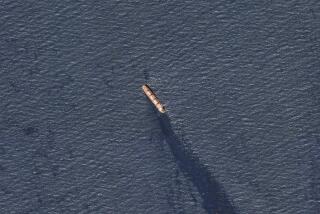Gulf Nations Seek Oil Spill Strategy : Environment: Saudi Arabia asks its neighbors for help as three massive slicks begin to wash ashore.
- Share via
MANAMA, Bahrain — The Persian Gulf nations, gathering for the first time Sunday to weigh the consequences of three massive oil spills moving toward their coasts, heard an appeal for help from Saudi Arabia, where the oil is already lapping ashore.
Iran, which has declared its neutrality in the Gulf War, sent a diplomat to the conference and offered its expertise in fighting the oil slicks. Iran suffered countless oil spills during its eight-year war with Iraq.
Nazir Toufiq, a deputy director of Saudi Arabia’s Meteorological and Environmental Protection Agency, told representatives of the Gulf states at the meeting that three separate spills were now expected to hit their shores.
Derek Brown, an adviser to Bahrain’s oil company, said Toufiq estimated the smallest spill at between 500,000 and 1 million barrels of oil. The source of that spill was leakage in the Saudi coastal town of Khafji from storage tanks that were hit by Iraqi artillery shortly after the war began Jan. 16.
The oil from the Khafji spill has moved slowly down the Gulf because of intense southerly winds, which have actually blown the oil offshore. Nonetheless, oil was beginning to come ashore at Safaniah, about 25 miles south of Khafji. The Saudis have concentrated most of their efforts so far on fighting this spill.
They have deployed huge flotation booms around water desalination plants, electricity generating stations and other facilities in Jubail, another 20 miles to the south, to protect those installations against the floating oil. The city provides much of the tap water to the Saudi capital city, Riyadh.
With current winds, Toufiq predicted the first edge of the slick would hit Jubail by Wednesday.
Toufiq also estimated a second spill--which U.S. officials say was released by Iraqi forces from Kuwait’s offshore Sea Island Terminal--at 7 million barrels. That spill, too, was moving slowly in the Gulf because of the heavy winds.
A third spill of unknown dimensions was reported still leaking from an Iraqi oil facility in the far northwestern corner of the Gulf at Mina al-Bakr. The oil has been leaking for five days, and officials expressed concern that it could prove to be even larger than the Sea Island Terminal spill. It was not clear whether the Mina al-Bakr spill was deliberate.
“As far as I know, the discharge is still going on,” said Lt. Cmdr. Paul Milligan, a spokesman for the U.S. Coast Guard in Dhahran. “We don’t know the flow rate, but it’s potentially very large.”
Toufiq appealed to his colleagues from Bahrain, Qatar, the United Arab Emirates, Oman and Iran to provide experts to Saudi Arabia to form part of an “oil spill response team.”
The Saudi official was quoted as saying his government had plenty of labor available but lacked the necessary expertise to know where to deploy equipment or which methods of combatting the spill were best. Teams from the United States and Britain are already in Saudi Arabia advising the government, and a Canadian team arrived in Bahrain on Sunday to offer advice to this island nation on how to fight the spill.
Countries around the world have offered the Saudis equipment to contain the oil, with a jumbo jet from Japan due to arrive Tuesday with more flotation booms, and equipment from Britain’s North Sea oil fields expected Thursday.
In addition, a special oil spill-fighting ship from Norway took up station off Safaniah on Sunday and began soaking up oil. The ship can reportedly clean one square kilometer of oil from the surface of the sea each day.
In Riyadh, a British military spokesman announced that the Royal Society for the Prevention of Cruelty to Animals had assembled a team of volunteers, who were flying in to help wash rare cormorants and other birds that have been coated with oil.
More to Read
Sign up for Essential California
The most important California stories and recommendations in your inbox every morning.
You may occasionally receive promotional content from the Los Angeles Times.













